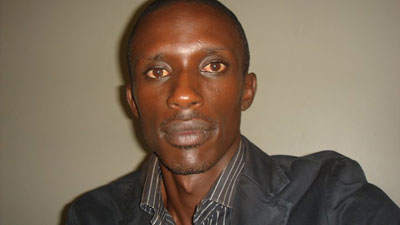The crime reporter for Uganda’s vibrant Daily Monitor, Andrew Bagala, went to an odd funeral over the weekend. Last week, he covered the murder of online journalist Charles Ingabire, 32, who was shot dead in the early hours of Thursday morning by unknown gunmen at a bar in a Kampala suburb. “I decided to follow up the case and attend the funeral,” he told me. “It was first funeral I have ever been to in Africa where there was silence.”
Instead of the customary cries and wails, Bagala said, people wept quietly to themselves. “Even the speakers – usually at an African funeral everyone wants a chance to say something, good things about the deceased. But here no one wanted to talk.” In fact, only two pastors spoke at the funeral, and one of them did not give his second name, he said. When Bagala attempted to interview mourners, they declined to give their identities or have their photographs taken. Many attendees, he said, had fled Rwanda and feared agents would spot them.
Scattered amidst the mourners in the pews at the Evangelical Restoration Church were Ugandan and Rwandan security agents with walkie-talkies in their coat pockets, Bagala said. With such a tense atmosphere, it’s not surprising the whole service lasted only 20 minutes.
It is certainly too early to point fingers at anyone for the murder. The online journalist hardly practiced journalism while in Rwanda, except for a brief period at Umuco, a newspaper banned in 2008. Once Ingabire left Rwanda in 2007, he worked briefly for another publication, Umuvugizi (which has also periodically been banned), before he launched Inyenyeri News. The website appeared to be well read both inside and outside Rwanda, local journalists told me. Ingabire was a former soldier, and Inyenyeri News had many stories about the army, including testimonies from exiled soldiers which made the site popular in Kigali and in the diaspora. Two months prior to his murder, unidentified individuals attacked Ingabire, demanding that he stop publishing the website. Fearing further attacks, Ingabire had applied for resettlement to a third country, but the United Nations High Commission for Refugees rejected the application due to his former soldier status, colleagues told me.
The quiet, quick funeral is indicative of the trials and tribulations exiled Rwandan journalists face. Some media columnists claim their colleagues fled Rwanda in order to “get rich from international NGOs” or to get “quick resettlement” to a Western country. Nothing could be further from the truth. In all the cases of Rwandan exiled journalists I have encountered, the journalists have left with heavy hearts and light pockets, to live a destitute existence in a neighboring country. For those who apply for resettlement, the arduous process takes years. Worse, none of them feel safe even after they have settled outside Rwanda. Many of the mourners at Ingabire’s funeral told Bagala they lived in the outskirts of Kampala and feared the city center because of the heavy presence of agents there.
